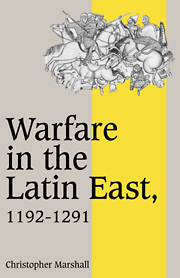Book contents
- Frontmatter
- Dedication
- Contents
- List of Illustrations
- Acknowledgements
- List of abbreviations
- Map
- Introduction: the Study of Warfare in the Latin East
- Chapter 1 Warfare and the History of the Latin East, 1192-1291
- Chapter 2 The Latin Armies
- Chapter 3 Castles and Strongpoints
- Chapter 4 Battles
- Chapter 5 Raiding Expeditions
- Chapter 6 Sieges
- Conclusion
- Appendix Scouts, Spies and Traitors
- Bibliography
- Index
Chapter 6 - Sieges
Published online by Cambridge University Press: 07 September 2023
- Frontmatter
- Dedication
- Contents
- List of Illustrations
- Acknowledgements
- List of abbreviations
- Map
- Introduction: the Study of Warfare in the Latin East
- Chapter 1 Warfare and the History of the Latin East, 1192-1291
- Chapter 2 The Latin Armies
- Chapter 3 Castles and Strongpoints
- Chapter 4 Battles
- Chapter 5 Raiding Expeditions
- Chapter 6 Sieges
- Conclusion
- Appendix Scouts, Spies and Traitors
- Bibliography
- Index
Summary
INTRODUCTION
The fate of the Latins in Palestine and Syria was decided by a succession of siege campaigns, which were conducted by Muslim armies throughout the period and with particular effect after the succession of Baybars to the Mamluk sultanate. Other forms of military activity were therefore largely incidental. Raids, when used by the Muslim armies, could help to weaken and isolate a Christian site as part of the preparation for a siege. Battles could, in theory, decimate the limited manpower which was available and, as in the case of Hattin in 1187, have such a decisive impact that many subsequent sieges presented few difficulties to the victorious Muslims. But neither raids nor battles, on their own, had a decisive influence on the military history of the period 1192—1291. Both allowed the possibility of recovery, a process which would normally rely heavily on the protection which the strongpoints were able to provide. If, on the other hand, the strongpoints themselves had succumbed to enemy pressure, then the recovery process was made, at best, considerably more difficult.
Sieges were therefore of fundamental importance in the military history of this period. The ability to control territory was largely determined by the possession of strongpoints and they would, ordinarily, only change hands as a consequence of a military campaign — although some sites were acquired by treaty. It was for this reason that in the thirteenth century the Latin army was geared to operate principally as a series of garrison forces within the strongpoints. Additional troops — particularly crusaders — enabled the Latins to undertake operations which they would not have otherwise attempted. But the strongpoint and the garrison within it were the obstacles which the Muslims had to overcome if they were to recover the Holy Land from the Christians.
In the twelfth century, as well as the thirteenth, the walled towns and castles were the ultimate expression of Latin authority in the region. But the military conditions in the thirteenth century were somewhat different from those of the earlier period. The progressive Muslim expansion, particularly in the second half of the century, ended with the eradication of the Christians through the fall of the remaining Latin strongholds in 1291.
- Type
- Chapter
- Information
- Warfare in the Latin East, 1192–1291 , pp. 210 - 256Publisher: Cambridge University PressPrint publication year: 1992

